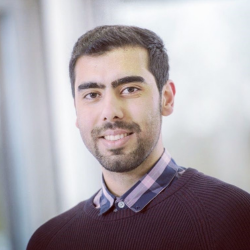Mo Lotfollahi
Computational biology, Machine learning, Drug discovery
Biography
Dr. Mo Lotfollahi is a faculty member at the Wellcome Sanger Institute and the Cambridge School of AI in Medicine at the University of Cambridge. In addition to his academic work, he has experience in both biotech and tech industries, having worked at Relation Therapeutics and Cellarity, as well as Facebook AI. He is also a member of the European Laboratory for Learning and Intelligent Systems (ELLIS). His work primarily focuses on leveraging artificial intelligence and advanced experimental techniques to engineer cells, modulate their responses to disease and perturbations, and apply these innovations in diagnostics, therapeutics, and drug discovery. He has received multiple awards for his research and has been featured in various press outlets and journals
Research Summary
Mo's lab seeks to leverage AI and advanced experimental techniques to engineer cells and modulate their response to disease and perturbations. These engineered cells will ultimately enable us to create cells resistant to disease and design personalised therapies to intervene at the cellular level.
Vision
Our vision is to create a digital version of every human cell in all organs, enabling an understanding of cell behaviour in the tissue and response to perturbations. We will seek to engineer resilient cells that resist diseases or reverse them by precisely modulating target cell behaviour to design personalised therapies. This mission leverages state-of-the-art machine learning and artificial intelligence, high-throughput genomics and imaging, and perturbation experiments. Our team will be interdisciplinary, including computer scientists, bioinformaticians, and biologists to collaboratively drive our mission.
Biological systems
We will be working on experimental models to generate large-scale perturbation experiments to study:
- Modelling and modulating cellular interaction and response during neurulation. We study complex genetic interactions and their downstream gene regulatory networks leading to dysregulated inflammatory responses.
- We seek to understand which genetic variations and regulatory networks modulate T-cell activation and gene expression dynamics.
Understanding the system through Artificial Intelligence and High-Throughput Genomics
To create better cells, we must first understand their health and disease functions. We will actively contribute to the Human Cell Atlas (HCA) project, aiming to build digital twins
for each organ. Our approach will span multiple scales:
- starting with the behaviour of individual cells
- moving up to their interactions within tissues
- then their impact on overall organ function
- and, ultimately, the genetic variations that distinguish us at each level.
Modelling the system changes through Artificial Intelligence and Experimental Perturbations
Understanding a biological system necessitates understanding how individual components respond to perturbations, i.e., our cells. The space of potential perturbations in biology is vast, ranging from genetic manipulation to small molecules. Observing the system’s behaviour in response to every possible perturbation is experimentally impractical. Therefore, we will combine machine learning with extensive perturbation experiments to identify the perturbations that induce the specific cellular behaviours of interest.
Leveraging AI, High-Throughput Genomics and Perturbations for Cell engineering and medical therapies
Once we understand normal and disease-related system behaviours and responses to perturbations, we can design enhanced cells and, potentially, whole organs. We will overcome our in vitro systems’ accuracy limitations by integrating Human Cell Atlas data with our in-house data generation efforts. We will then apply Machine Learning to compare our in vitro systems with in vivo references to refine our cell engineering and organ generation methods. This approach holds great potential for cell therapy, regenerative medicine, and personalised
medicine.



